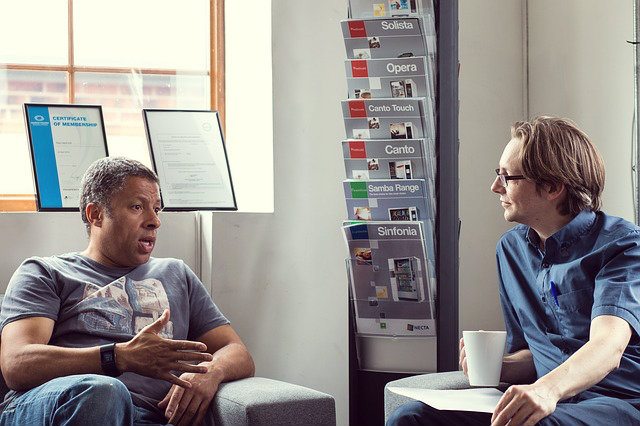It’s among the top skills employers look for in a new hire. It can determine a person’s success from entry level through top leadership. It can directly impact money-making potential. But it’s not taught in most schools or homes.
It’s listening.
What makes good listeners? It’s more than simply learning to sit quietly, appearing to listen. Listening is an active mental process that requires your full attention. This doesn’t come naturally for many people, especially in today’s busy work environments.
 To become a good listener, you must take full responsibility for developing this sought-after skill. The rewards for doing so are often great.
To become a good listener, you must take full responsibility for developing this sought-after skill. The rewards for doing so are often great.
Let’s explore the nine steps you can take to put yourself among the ranks of good listeners.
1. Be Aware of Wandering Thoughts
When you’re having a conversation, you think you’re in the moment, paying attention. But most people are not. They’re thinking about things they need to do. They may think about how the person they’re speaking with has wronged them in the past.
They may be stressed about an argument before work. They may be thinking about what they’re going to say or wondering when this conversation will be over.
All of these wandering thoughts take you out of the moment. They may cause others to see you as disinterested or scattered. Whether you’re in upper management or positioning yourself for that next promotion, neither label is one that you want.
The first step to becoming a better listener is paying attention to how your mind may wander. Gently redirect your mind into the conversation. As you do, become more aware of nuances you may normally miss.
2. Avoid Trying to Think Up the Perfect Answer
Are you trying to decide what to say while a person is speaking? If so, you’re not alone. People don’t want to say the wrong thing, so they use “listening time” as planning time. But in the process, they’re not actually listening. This is a hard habit to break.
Natural and authentic conversations don’t require planning. When you’re really listening, the “right” thing to say and when to say it will come naturally. Good listeners interrupt less and ask more relevant questions.
Are you struggling with this one? Just know that the more time you spend practicing active listening, the easier natural conversation will become.
 3. Practice Mindfulness Activities
3. Practice Mindfulness Activities
Mindfulness activities help a person practice staying in the moment. These are activities that you do alone in a quiet place with all your devices turned completely off.
Some common mindfulness activities include:
- Watching the clouds or something else that moves very slowly
- Sitting quietly with your eyes closed (meditation). Also, try meditative music.
- Focusing on an object like a rock, leaf or intricate pattern, making note of the colors, textures, patterns, etc. that you see/feel
Even short periods of time doing these activities can help improve your listening skills. They help retrain your brain to stay focused on something for longer periods of time. Try doing a mindfulness activity two or three times a day for five to ten minutes at a time.
4. Eliminate Distractions
Are you typing or checking your messages while someone is speaking? These distractions not only limit how much either of you will get out of the conversation, but they also waste time. Yes, you heard that right. You may think you’re multi-tasking and getting more done. But the data to support how unproductive multi-tasking is vast.
- It takes more time to do each activity than it would if you did one at a time. That means conversations are longer. Or you have to have the conversation again.
- Error rate increases
- Productivity drops by 40%
To become a better listener, focus only on listening when it’s time to listen.
5. Seek to Understand
As you eliminate barriers to listening, think about why you’re listening in the first place. Effective communication in the workplace is a major indicator of success. We communicate to understand our work and the people around us. We all have goals to meet. Effective communication is how we get things done.
Good listeners have a high emotional intelligence. They can empathize. They can put themselves in other people’s shoes. They’re less likely to lash out, manipulate or try to hurt others. This is greatly valued in the workplace for a reason.
Approach each conversation with a growth mindset. That’s the idea that each moment is an opportunity to learn, grow and adapt. Having this mindset going into a conversation will help you receive the information, messages and understandings being offered to you.
Will there be ideas you need to discard from the conversation? Certainly. But by approaching listening as a way to understand and grow, you’re less dismissive of new ideas. You are more receptive to solutions. You’re seeing the person as a human being who adds value to your life and the workplace.
You’re actually listening to what a person has to say.
6. Be Aware of Hidden Thoughts and Feelings
An estimated 95% of thoughts and feelings happen below the surface of your conscious thoughts according to business listening and customer experience expert Lynn Hunsaker. Although hidden in the subconscious mind, they can influence how you perceive the words and actions of others.
Like the proverbial “rose-colored glasses,” they make what you hear and what you think you hear two very different things. Helpful suggestions can feel like an attack on your job skills — or even insubordination. A simple question from an employee may imply incompetence if you’ve already subconsciously decided that this person is unfit for their job.
These hidden perceptions may cause you to respond in an unprofessional or unwarranted way. But simply being aware of how these deeply rooted biases may be painting the conversion will help you listen to what a person is saying.
7. Be Aware of Body Language
While you can’t actually put a number on it, experts estimate that as much as 80% of communication is non-verbal. To be a good listener, it’s important to see the whole picture.
For example, a person’s actions may suggest that they’re lying or withholding information. A sudden change in voice, trying to sit very still or movements inconsistent with the spoken words may indicate this. Frowning, side-glancing of fidgeting can suggest that someone is bored and really isn’t listening to you.
Tap into the messages conveyed through these visual cues to be a better listener in the workplace.
8. Practice Mind-Mapping
This one takes some practice. But it’s the perfect tool for listening better and retaining more. Multiple independent studies support its effectiveness. Those using the technique had 32% greater memory retention and 10% greater recall of specific facts like dates, places, names, etc. It has even demonstrated its ability to overcome creative blocks and improve creative thinking. It makes it easier to concentrate on a speaker longer.
As a person speaks, pick out important information. Create a very basic mental diagram of that information. While this may sound distracting, with practice you’ll integrate this into your skill-set. It becomes second nature. Eventually, you won’t realize you’re doing it. But the results speak for themselves.
9. Set a Practice Schedule
Give developing your listening skills the time and attention something this important deserves. You don’t become a better listener with half-hearted efforts.
Start incorporating these steps into your day one or two at a time. Set aside some time to practice listening with a friend or co-worker. Create some professional goals around listening. Make note of the improvements in your work environment as well as your personal life.
Good Leaders and Star Employees Are Both Good Listeners
To become a good listener, you must first become aware of your own thoughts. How might they be taking you out of the moment. Eliminate distractions and be mindful of how hidden feelings or beliefs can impact what you think you hear. As you do, you’ll become a more productive listener.
And you’ll see that fact reflected in work and personal relationships. Set some goals and how yourself accountable to master this essential skill.









